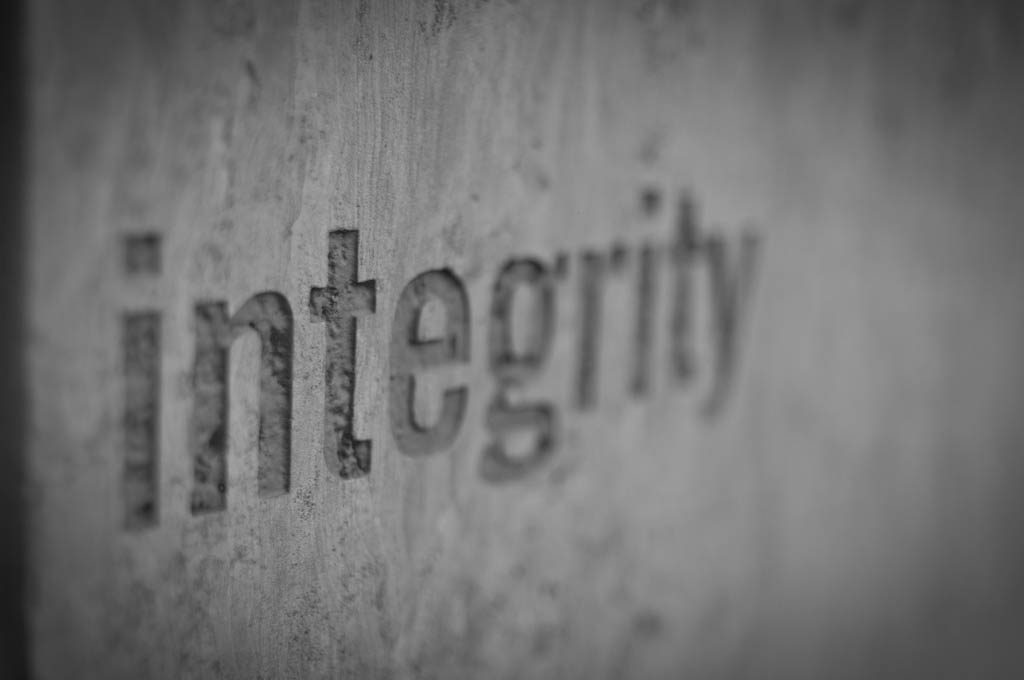
Integrity is the quality of being honest and having strong moral principles; moral uprightness. It is generally a personal choice to hold oneself to consistent moral and ethical standards. In ethics, integrity is regarded by many people as the honesty and truthfulness or accuracy of one’s actions. Integrity can stand in opposition to hypocrisy, in that judging with the standards of integrity involves regarding internal consistency as a virtue, and suggests that parties holding within themselves apparently conflicting values should account for the discrepancy or alter their beliefs. The word integrity evolved from the Latin adjective integer, meaning whole or complete. In this context, integrity is the inner sense of “wholeness” deriving from qualities such as honesty and consistency of character. As such, one may judge that others “have integrity” to the extent that they act according to the values, beliefs, and principles they claim to hold. From Wikipedia, the free encyclopedia.
The vision of The United Societies is to establish its membership as a world-class society committed with integrity, to  human advancement and social peace globally as neighbors everywhere. The basic membership is a neighbor as an advancer or peacemaker through the Society for World Advancement and it’s parallel society the Society for World Peace, but both memberships will also be united together through the World Benevolence Association into a benevolent friendship membership. The societal membership is service based and will be where leadership integrity is achieved by a commitment to the golden-rule, “do unto others as you would want them to do unto you”, it’s really that simple: People I can’t tell you how important it is to be fair and honest with yourself and everyone else!
human advancement and social peace globally as neighbors everywhere. The basic membership is a neighbor as an advancer or peacemaker through the Society for World Advancement and it’s parallel society the Society for World Peace, but both memberships will also be united together through the World Benevolence Association into a benevolent friendship membership. The societal membership is service based and will be where leadership integrity is achieved by a commitment to the golden-rule, “do unto others as you would want them to do unto you”, it’s really that simple: People I can’t tell you how important it is to be fair and honest with yourself and everyone else!
The concept of integrity implies a oneness, a comprehensive corpus of beliefs, often referred to as a worldview. This concept of wholeness emphasizes honesty and authenticity, requiring that one act at all times in accordance with the individual’s chosen worldview. Virtue ethics describes the character of a moral agent as a driving force for ethical behavior, in this view, knowledge bearing on human life was placed highest, while all other knowledge were secondary. Self-awareness was considered necessary for success and inherently an essential good. A self-aware person will act completely within his capabilities to his pinnacle, while an ignorant person will flounder and encounter difficulty. A person must become aware of every fact (and its context) relevant to his existence, if he wishes to attain self-knowledge. He posited that people will naturally do what is good, if they know what is right. Evil or bad actions are the result of ignorance. If a criminal was truly aware of the intellectual and spiritual consequences of his actions, he would neither commit nor even consider committing those actions.
The word “ethics” in English refers to several things. It can refer to philosophical ethics or moral philosophy—a project that attempts to use reason in order to answer various kinds of ethical questions. Ethics can also be used to describe a particular person’s own idiosyncratic principles or habits. For example: “Joe has strange ethics.” In ethics when discussing behavior and morality, an individual is said to possess the virtue of integrity if the individual’s actions are based upon an internally consistent framework of principles. These principles should uniformly adhere to sound logical axioms or postulates. One can describe a person as having ethical integrity to the extent that the individual’s actions, beliefs, methods, measures and principles all derive from a single core group of values. An individual must therefore be flexible and willing to adjust these values in order to maintain consistency when these values are challenged; such as when an expected test result fails to be congruent with all observed outcomes. Because such flexibility is a form of accountability, it is regarded as a moral responsibility as well as a virtue.